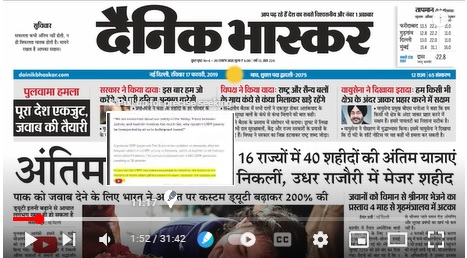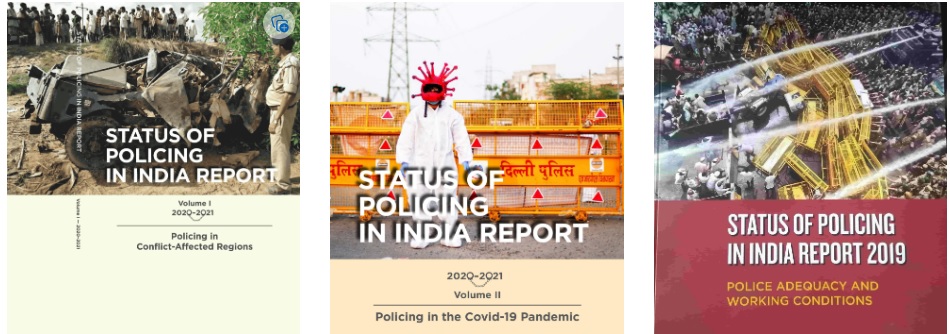Section 27 Evidence Act Statement Not Liable To Be Rejected Merely Because It Was Recorded In A Language Not Known To Accused Through Translator https://www.livelaw.in/top-stories/section-27-evidence-act-statement-not-liable-to-be-rejected-merely-because-it-was-recorded-in-a-language-not-known-to-accused-through-translator-supreme-court-226980.. the ultimate test would be whether the statement was noted down as told by the accused. When the statement is being recorded in the language not known to the accused, the assistance of interpreter if taken by the police cannot be found fault with.
 मलिक को CBI का बुलावा, पवार का बयान ग़ायब! | Satyapal Malik summoned by CBI https://www.youtube.com/watch?v=dodXFiDgOY4 Apr 22, 2023
मलिक को CBI का बुलावा, पवार का बयान ग़ायब! | Satyapal Malik summoned by CBI https://www.youtube.com/watch?v=dodXFiDgOY4 Apr 22, 2023
अगर सीबीआई सत्यपाल मलिक के लगाए आरोपों का संज्ञान ले रही है तो भारत के प्रधानमंत्री नरेंद्र मोदी उन्हीं सत्यपाल मलिक के लगाए आरापों का जवाब क्यों नहीं दे रहे हैं? मलिक के आरोपों पर शरद पवार के बयान भी गोदी मीडिया ने ग़ायब कर दिए हैं। वैसे गोदी मीडिया सेना, जवान, देश की रक्षा को लेकर हमलावर हो जाता है, मगर जब इसमें लापरवाही के सवाल सरकार से पूछे जाते हैं तो चुप हो जाता है। साफ़ है गोदी मीडिया देश की नहीं उस सरकार की चिंता करता है, जिसके कारण उसका नाम गोदी मीडिया पड़ा है। आज ईद है। आप सभी को ईद की हार्दिक शुभकामनाएँ।
Sansad में कम हो जाएंगी दक्षिण की सीटें ! जातिगत जनगणना पर मुखर Congress, कर दी बड़ी मांग https://www.youtube.com/watch?v=5-x20Sp4WWo Apr 22, 2023
TWeets: Mallikarjun Kharge @kharge 21 Apr
2️⃣ जातिगत जनगणना का डेटा सामाजिक न्याय के लिए बहुत ज़रूरी है।
आम Census में SC वर्ग, ST वर्ग की जनसंख्या तो पता चलती है पर OBC वर्ग की नहीं, जिससे उनके आरक्षण का सही अनुपात तय नहीं हो पाया है।
2022 के सुप्रीम कोर्ट के एक फैसले के बाद स्थानीय निकायों में आरक्षण विभिन्न जातियों की आबादी के अनुसार ही तय होना है।
भाजपा को अगर सही में OBC वर्ग की फ़िक्र है तो टले हुए Census 2021 में ही जातिगत जनगणना कराएँ और OBC को अनुपात के हिसाब से आरक्षण मुहैया कराएँ।
जातिगत जनगणना से BJP क्यों डरती है ?
🔹2011-12 में जो जातिगत जनगणना हुई, खाद्य सुरक्षा क़ानून जैसी कल्याणकारी योजना उसी आधार पर संभव हो सकी।
🔹मोदी सरकार ने 2015 में अरविंद पणगरिया कमेटी बनाकर जातियों का वर्गीकरण का कार्य शुरू कराया।यह क्यों किया गया तथा उसकी रिपोर्ट कहाँ है ?
अगर मोदी सरकार के मंत्री और उनका पूरा Eco System, OBC वर्ग की दिखावटी भलाई के लिए घड़ियाली आंसू बहाते रहते है, तो जातिगत जनगणना और Census 2021 एक साथ फ़ौरन क्यों नहीं कराते ? “Socio Economic Caste Census” यानि जातिगत जनगणना,Census का अभिन्न हिस्सा होना चाहिए। यही हमारी माँग है।
Pratap Mehta: Democracy in India - Democracy in the World https://www.youtube.com/watch?v=W5Z43HDB010 Dickey Center for International Understanding Apr 10, 2023
Pratap Mehta in conversation with Russ Muirhead April 6, 2023. Full blown tyranny? How did we get there. https://youtu.be/W5Z43HDB010?t=281 Bewilderment . but can say.. RM modi is popular, and so far he has acquired legitamcy through proper electoral means. 2. unlike other right rulers, modi is less incompetent a manager of the economy . it will not face theeconomic crisis that Left thinks.. Expansion of state capacity which will ensure that there is no brad based economic crisis
Still regime is authoritarian, control information order, Checks and balances in the insitutional strcuture have collapsed.
Fake Aadhaar, PAN Cards a Click Away: Report https://www.moneylife.in/article/fake-aadhaar-pan-cards-a-click-away-report/70495.html
Moneylife Digital Team 19 April 2023 Culled Electoral Rolls, unverified EVM/VVPAT voting and counting, fake Voter IDs and massive money and media power... Comment by MGD: Aadhar is now being aggressively linked with Voter ID with the active involvement of ECI... This, despite strong opposition from domain experts and civil society.. Citizens Commission on Elections also took a strong stand against this.. Yet government and ECI bulldozed it through.. Comment by SSen: This would go against the Supreme Court verdict in the Aadhaar case. I. Supreme Court had mandated linking with Aadhaar compulsorily with PAN
Card and the ITR filed.
II. It's use is mandatory also for availing any welfare scheme of the State. That's all.
It cannot be used compulsorily for any other purpose. Doing otherwise would be an act of violation.
Fake Aadhaar, PAN Cards a Click Away https://timesofindia.indiatimes.com/city/vadodara/fake-aadhaar-pan-cards-a-click-away/articleshow/99504918.cms .. 15th APR 2023 Any person with some basic knowledge of the dark web can easily prepare a fake identity card of anybody using some websites and applications.
Online fraudsters get creative, come up with newer ways to dupe people in Visakhapatnam https://www.thehindu.com/news/cities/Visakhapatnam/online-fraudsters-get-creative-come-up-with-newer-ways-to-dupe-people-in-visakhapatnam/article66166003.ece November 22, 2022
The latest being Aadhaar card fraud, in which an accused fabricated an Aadhaar card of the victim without her knowledge, says Police Commissioner
For criminals, Aadhaar is the easiest tool to cheat or dupe anyone, including lenders and individuals. With Aadhaar, anyone can easily get a SIM card, open a bank account, and obtain various things. The reason is there are no real-time checks when one submits Aadhaar as ID proof .. In fact, earlier this month, the Union government admitted that nearly 6%, or more than 60mn (million) dead people, still hold their Aadhaar numbers since there is no provision to delete or deactivate these numbers. https://moneylife.in/article/nearly-6-crore-dead-people-still-have-aadhaar-numbers-govt/70358.html
RFID surveillance technology used in State (Meghalaya) for first time https://highlandpost.com/rfid-surveillance-technology-used-in-state-for-first-time/ 
Journalists stopped short by their own mug-shots April 18, 2023 in Meghalaya,
Hi-tech surveillance technology debuted today into this hill state with Radio Frequency Identification (RFID) issued to tag every delegate and visitor including media persons entering the premises of Hotel Courtyard Marriott, here for the two-day Space Economy Leaders Meeting (SELM) precursor event.
Journalists were the first to come uncomfortably face to face with impact of RFID tracking when some of them nonchalantly wandering around the venue in the course of their work, found themselves stopped short by their own mug-shots, name and designation, suddenly appearing on a big monitoring screen at the entrance of the conference hall of the G20 meet, with the legend in bold caps, “NOT ALLOWED” under the photo...the press had already been instructed that they are permitted to enter the conference hall only to cover the inaugural session. They do not have permission to cover the technical session of the meeting...However reporters being reporters, it is routine for them to loiter around the main venue, even if they are not allowed inside, to catch any delegates for a quick comment and/or seek interviews.
Statistics Show More Muslim Convicts than Hindu, But What's Behind these Numbers? https://thewire.in/rights/statistics-show-more-muslim-convicts-than-hindu-but-whats-behind-these-numbers Malvika Tyagi Might socioeconomic and political factors and police prejudice explain the proportion of Muslims being higher in the total number of convicts in India vis-à-vis their population proportion in the country?
looking at the maximum percentages that Muslim convicts can take over the studied time period, Muslims comprised approximately 11.9%, 9.2%, 11.54%, 26.35%, 8.83% respectively of the population in each of the aforementioned states, but comprised approximately 22.8%, 19.2%, 31.6%, 52.8%, 28.8% of the convicts in these states.
I ran a simple OLS (Ordinary Least Squares) regression (an econometrics tool) that assessed the impact of socioeconomic and political factors (poverty, unemployment, educational level) on the ratio of Muslim to Hindu convicts. The control variable in the OLS regression was the Muslim population relative to the Hindu population. The preliminary results of the regression test revealed that the number of Muslim convicts relative to Hindu is adversely affected or increased by the higher relative rural poverty and urban unemployment of the minority, but favourably affected or decreased by the higher relative education indicators of the minority. Furthermore, when a higher percentage of state legislative assembly seats are occupied by the minority community, their relative conviction is lower.
the Status of Policing in India Report (SPIR) of 2019, which categorically mentions that the data its researchers collected found that police personnel seem to hold a significant bias against Muslims. 
Discussion in JNU. 18 Apr 2023. Global Channel: issue: https://youtu.be/Q1VKbf-xvF4?t=339 Media post 2014 https://youtu.be/Q1VKbf-xvF4?t=442
Ravish Kumar responsing to question about jobs, and education .. https://youtu.be/Q1VKbf-xvF4?t=1798
https://youtu.be/Q1VKbf-xvF4?t=1930 Will the economic niti change.. Now it is important to link the current adani issue to the general economic policy/system.. and we need to see how any new regime will undertake this change.. linked to A new Nationalism - Adani nationalism
New research by the Harvard TH Chan School of Public Health links pollution and exposure to fine particulate matter (PM 2.5) to increased risk of dementia! https://www.theguardian.com/environment/2023/apr/05/experts-call-for-stricter-air-pollution-targets-to-tackle-dementia-risk > ,
NCERT's Controversial Deletions Of Indian History Stoke Fears Of The Politicisation Of Education https://www.youtube.com/watch?v=cAk35hdMpOY Apr 15, 2023
NCERT's selective deletions of crucial periods in Indian history in the name of rationalisation of school curricula stokes fears of the politicisation of education. At this time, a key question comes up: is it the first time? In this video, Raj Chengappa breaks down the deletions in history textbooks and brings to light similar instances of the past.
CM Arvind Kejriwal का Foreign Training करके आए Teachers के साथ Interaction | Aam Aadmi Party https://www.youtube.com/watch?v=MdkrFK0VLYg
Aam Aadmi Party
4.55M subscribers
Subscribe
4.1K
Share
Save
150,780 views Streamed live on Jan 22, 2023 #ArvindKejriwal #aamaadmiparty #aap
CM Arvind Kejriwal का Finland, Cambridge and Singapore Training करके आए Teachers के साथ Interaction | Aam Aadmi Party.
- Indian Political Thought in the Global Age: Shruti Kapila
- Violent Fraternity: Indian Political Thought in the Global Age review:
- Pokhran-II and Since - A Quick Analytical Survey
- Deletions from Textbooks
- Export data and WhatsApp uncle-aunty!
- From Norm to Law, A Declaration of Public Conscience
- GN Devy on attempts to rewrite history, and how the version is being created which is not about the real history of India or Indian civilization
- Reclaiming our Republic | Yogendra Yadav
- EXPECTATIONS OF POST RETIREMENT LIFE
- Did security drill scare away tigers ahead of PM Modi’s safari?
- Criminal intent, direct act instigating suicide must to prove abetment
- Balika Panchayat
- Looking for urgent protection or rapid response funding?
- Viral Video of 'Ramayana' Playing at Noida Pub Sparks Arrests
- On Hate Speech Modi is Complicit By His Silence; It's His Duty To Speak Up- Naseeruddin Shah
- Whither Rationalisation? NCERT's Changes Only Leave a Black Hole in Our History Textbooks
- 'Obscenity': Two Maharashtra Rappers Booked for Hard-Hitting Songs on Social Injustice
- How 370 was removed..
- Diplomacy and the Political Economy of Cronyism
- End Of The Deshbhakt Near? | Govt. now to decide what is fact or fake!
